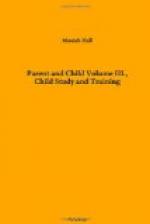The other mistake is to employ unnatural or arbitrary punishments. Even the smallest child has an instinctive idea of justice and resents anything which he regards as unjust. On the other hand, he learns quickly the inevitableness with which pain follows the violation of law, and how certain is the working out of cause and effect.
Mrs. Harrison gives this admirable illustration: “The little one puts his hand upon the hot stove; no whirlwind from without rushes in and pushes the hand away from the stove, then with loud and vengeful blasts scolds him for his heedlessness or wrong-doing. He simply is burned—the natural consequences of his own deed; and the fire quietly glows on, regardless of the pain which he is suffering. If again he transgresses the law, again he is burned as quietly as before, with no expostulation, threat, or warning. He quickly learns the lesson and avoids the fire thereafter, bearing no grudge against it.”
When the child scatters her toys and playthings all over the room, the natural penalty is to require that they be gathered up and the room made tidy; when the boy scampers across the newly-cleaned floor with his muddy boots, he should be made to mop up the floor carefully; thus in a thousand similar ways, the parent may train the child to observe care and order in everything done.
Nothing is more beautiful than a large family where each child is taught to care for and to rely upon himself, and to give a little willing service to others. But the tired mother will remark, “Oh, yes, that all sounds very nice, but mothers have no time to spare to eternally watch and train their children.” Hold a moment, there is a fallacy here; she ought to say, “I have no time to spare because I failed to train the children in the manner mentioned.” In no other way can the mother save so much time as by taking a little time at first to train the child to be neat, tidy and orderly, or later to feel the inevitable consequences of violating law.
Instead of saving time in this sensible way, too often the mother loses both time and the love of her child through becoming irritable and scolding the little one for every offence committed. Nothing is worse than scolding, a sound thrashing administered now and then is far less cruel. Nearly every evil instinct in the child is aroused through fault-finding and scolding. How long will it take to teach the parent, once for all, that scolding, nagging, shutting up in the dark closets, and every other form of arbitrary punishment arouse in the child a sense of injustice and resentment, which, if not corrected later, will result in estrangement and loss of love between parent and child? The child has a right to expect justice from his parent. Only where this is found will the child develop that sense of freedom and independence of thought and action which produce the highest type of individual—one who is able to govern himself.




